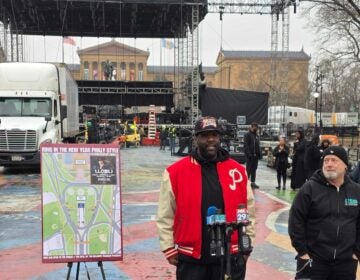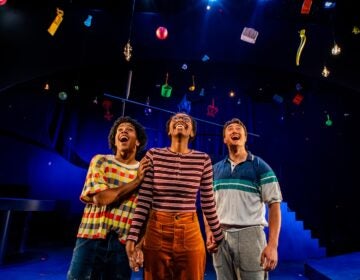Playing against type: Theater festival presents conservative views from liberal corners
-
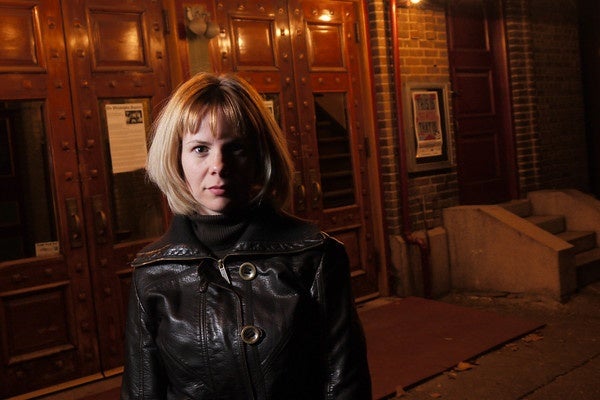
<p>Cara Blouin, director of the Republican Theater Fest, stands in front of the Plays and Players theater, 1714 Delancey Place in Center City Philadelphia. (photo: Kyle Cassidy)</p>
-
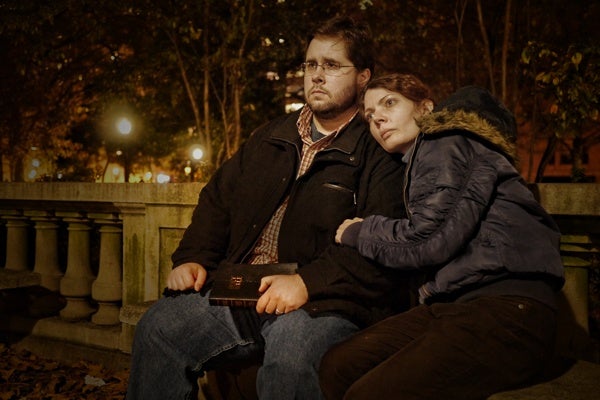
<p>Chris Morse and Jennifer Summerfield pose for a publicity still for the play "Battle Hymn," part of the Republican Theater Festival. (photo: Kyle Cassidy)</p>
-
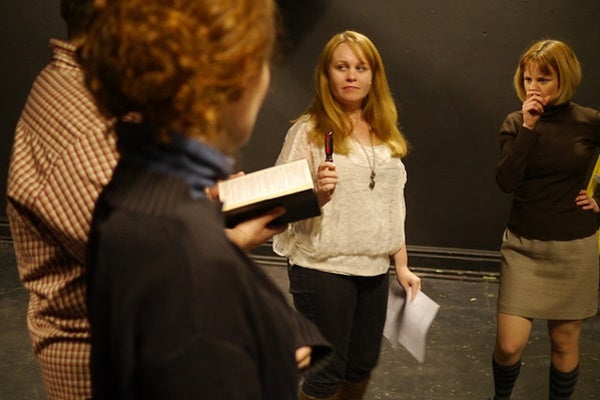
<p>Left to right: Actors Chris Morse, Jennifer Summerfield and Jessica Snow, and Republican Theater Festival director Cara Blouin, rehearse "Battle Hymn," about a group of Christians in a small Wisconsin town fighting the removal of a statue of Jesus. (photo: Kyle Cassidy)</p>
-
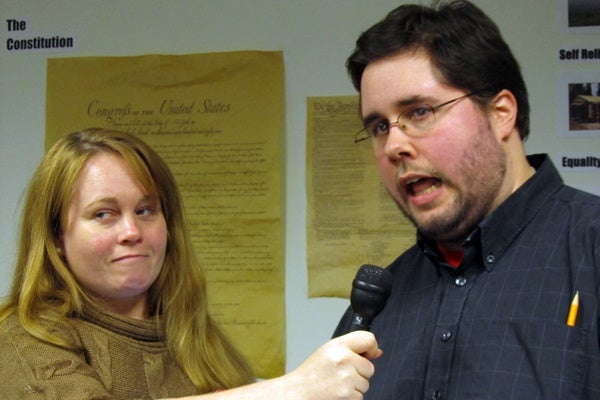
<p>Jessica Snow, playing a reporter, interviews actor Chris Morse during a rehearsal of the play "Battle Hymn," by Ludmilla Bollow of Wisconsin. (Peter Crimmins/WHYY)</p>
-
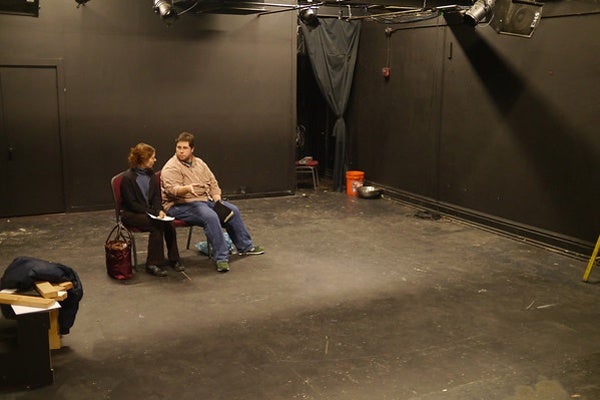
<p>Jennifer Summerfield and Chris Morse rehearse a scene for the play "Battle Hymn," part of the Republican Theater Festival. (photo: Kyle Cassidy)</p>
“I still can’t persuade people it’s not a joke,” said Cara Blouin. “They think I’m going to do the big reveal at the end.”
For months, Blouin has been planning the Republican Theater Festival, an experiment of producing short plays written from a politically conservative perspective, performed by actors and directors of a politically liberal persuasion.
Observers from both ends of the political spectrum are incredulous that the overwhelmingly liberal Philadelphia theater scene would produce a festival of politically conservative ideas.
“If I sat here I could probably name 15 plays where the theme is: Christianity is terrible, the suburbs are hell, the traditional values of middle-class America are fodder for mockery,” said Blouin. “But I don’t think I’ve ever seen a play that said the same thing about the values liberals hold.”
Blouin counts herself as one of those liberals, but she wanted to turn the tables. When she put out a call for 10-minute plays on conservative themes, she hoped for a handful (“I needed three to do a festival”). She was shocked when more than 100 came pouring in from around the world.
The plays touch on hot-button issues long fought over by liberals and conservatives: the economy, religion, war, abortion. The collection of one-acts are a concentration of political emotion, both red and blue.
Small-town Christians misrepresented by the media. Conservatives who don’t feel comfortable socializing at work. Republicans who feel their personal relationships might crumble if they reveal their voting habits. Many of the plays feature characters who feel alienated or marginalized.
Suspicions all around
Perhaps the only irony of the festival is that liberals feel the same way. And they, too, are suspicious of the festival.
“People feel like ‘they’ have television and ‘they’ have all the newspapers. ‘They’ have all the media outlets,” Blouin recounts what many liberals in the theater community have been telling her. “‘This is ours. Why invite them to this last bastion of liberal thought?'”
South Jersey-based playwright Walter Vail submitted one part of his four-part play, “Downsizing,” which comprises four perspectives on the effects of shrinking a company. Some sections of the play — the more liberal parts — have been produced several times, even winning awards. But this conservative section has never been staged.
“Undercoat Man” focuses on a meeting between a private equity executive in the process of downsizing an automobile company, and a union worker from the factory floor. Initially, the scene’s sympathy is with the worker, who is about to be laid off. But then things change when he admits that cars are intentionally flawed.
“We build a timer into every car, designed to self-destruct in three, four, five years,” explains the worker. “You finish paying for it, gotta start over again. Keep the line moving; keep our jobs.”
“Beautiful piece of logic,” said executive says. “Policy provided by management?”
“No, too stupid,” the worker scoffs. “That’s a union policy.”
“It’s saying labor was at fault — and management,” said Vail during a rehearsal of the play set in the 1970s. “At that time, motor companies were complacent. It wasn’t until Japanese competition with really quality cars that they started to get their act together. It reflects that period.”
Vail, a retired schoolteacher, wrote the play in the 1990s. It was never supposed to be conservative propaganda; he always wanted all four parts of “Downsizing” to be produced together, as they are designed to work in concert.
“When you write a play, you’re trying to show well-rounded human beings in all their faults and their attitudes,” said Vail. “You don’t get well-rounded characters unless you see them from all sides. So I try to sit on the mountaintop, you know.”
Selections have substance
The plays were chosen by a selection committee put together by Blouin, which read all 103 entries and weeded out the rants.
“We got a bunch of agit-prop. There were a lot of plays where someone walks into a bar, orders a whiskey, and then for 10 pages talks about the downfall of America,” said Blouin. “We didn’t pick plays like that.”
Here’s an excerpt from another play in the festival: “Battle Hymn,” by Ludmilla Bollow of Wisconsin. It’s about a group of Christians in a small Wisconsin town fighting against the forcible removal of a statue of Jesus. Tom and Mabel watch a bulldozer take down Christ.
Tom: “I just hope nobody gets killed trying to save him.”
Mabel: “I’m crying, Tom. I can’t help it. What did He do to hurt anyone? He didn’t hurt anyone.”
Tom: “There goes the bulldozer now. Smashing him apart as if he were the worst enemy.”
Mabel: “Oh, God. He’s down. He’s smashed into the earth.”
The actor playing Tom, Chris Morse, is a self-described atheist. He plays the part for real. There’s nothing tongue-in-cheek about it.
“Whether or not you agree with the ideas, the emotion is real,” said Morse. “I’m not religious — but I was. I was raised Catholic. The emotion is real. This is not a Jesus statue, this is a representation of God.”
The festival is just a week away — Nov. 12, 13, 14 — but one of the acts is proving too hot to handle. Blouin could not find any actors to perform in an anti-abortion play. She has begun discussions with the author of the selected script about a staged reading, instead of a full production.
WHYY is your source for fact-based, in-depth journalism and information. As a nonprofit organization, we rely on financial support from readers like you. Please give today.


